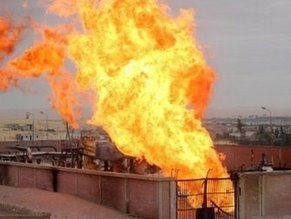|
World Jewish News

AFP – Flames rise from a gas pipeline attack in Egypt's northern Sinai.
|
Israel, Jordan gas cut after Egypt pipeline attack
06.02.2011, Israel and the World Saboteurs attacked an Egyptian gas pipeline to Jordan on Saturday, forcing authorities to switch off supplies from a twin pipeline to Israel, an official said, as anti-regime protests raged in Cairo.
Attackers used explosives against the pipeline in the town of Lihfen in northern Sinai, near the Gaza Strip, the official told AFP. It was initially thought the pipeline to Israel was targeted.
"The pipeline to Jordan has been attacked and the supply to Israel has been cut off," the official said.
The army has taken precautionary measures to stop the fire from spreading, the official added, as rescue services were putting out the flames.
It was not immediately clear who was responsible, or whether the attack was linked to the deadly protests against President Hosni Mubarak's rule, which entered their 12th day on Saturday.
A broad swathe of Egypt's opposition, including the powerful Muslim Brotherhood, as well as public opinion, has called for Cairo to stop supplying Israel with gas.
Egypt supplies about 40 percent of Israel's natural gas, and in December, four Israeli firms signed 20-year contracts worth up to 10 billion dollars (7.4 billion euros) to import Egyptian gas.
Israel has suspended imports of Egyptian gas "for security reasons," Prime Minister Benjamin Netanyahu's office said in a statement.
"But there will be no difficulties providing electricity to the Israeli population because there is a system of alternative energy supplies," the statement said.
The Israeli defence ministry said that it had strengthened security around its gas installations following the attack.
In Jordan, an official told AFP that the cut would cost the country -- the only other Arab nation besides Egypt to have signed a peace treaty with Israel -- 3.5 million dollars (2.7 million euros) a day.
"This cut will cost Jordan 3.5 million dollars a day as the kingdom will have to replace the gas with diesel and oil to fire the country's electricity generators," the official said, asking not to be named.
Jordan imports 6.8 million cubic metres of Egyptian gas a day, which, when burnt, accounts for 80 percent of Jordan's electricity needs, the official said, adding that he expected supplies to resume "in three or four days."
An armed Bedouin group in June threatened to attack the pipeline, security officials said, leading Egyptian authorities to beef up security around the pipeline and terminal.
Police relations with the region's former nomads are often tense, with the Bedouin complaining of routine harassment and discrimination.
Activists accuse the police of exploiting concerns about the pipeline to crack down on the community.
Human rights groups have criticised Egyptian policy towards the Bedouin, who faced harsh police treatment after a series of bombings in Sinai resorts between 2004 and 2006, which killed dozens of Egyptians and foreign tourists.
Saturday's attack came after Israel expressed concern that its natural gas supplies from Egypt could be threatened if a new regime takes power in Cairo.
"We again realise that the Middle East is not a stable region. We must act to ensure our energy security without relying on others," a spokesman for Israel's National Infrastructure Minister Uzi Landau said on Tuesday.
Israel is concerned that a post-Mubarak regime might not respect the peace treaty signed three decades ago -- potentially threatening the crucial energy supplies Egypt provides.
Landau on Monday summoned the heads of Israeli companies that are developing the offshore Tamar gas field -- due to start production in 2013 -- to urge them to push ahead with its timely development, his office said.
Landau told them Tamar's importance was even greater "in these times of unrest in our region."
The field, off the port city of Haifa in northern Israel, holds estimated reserves of eight billion cubic metres (280 billion cubic feet).
news.yahoo.com
|
|
